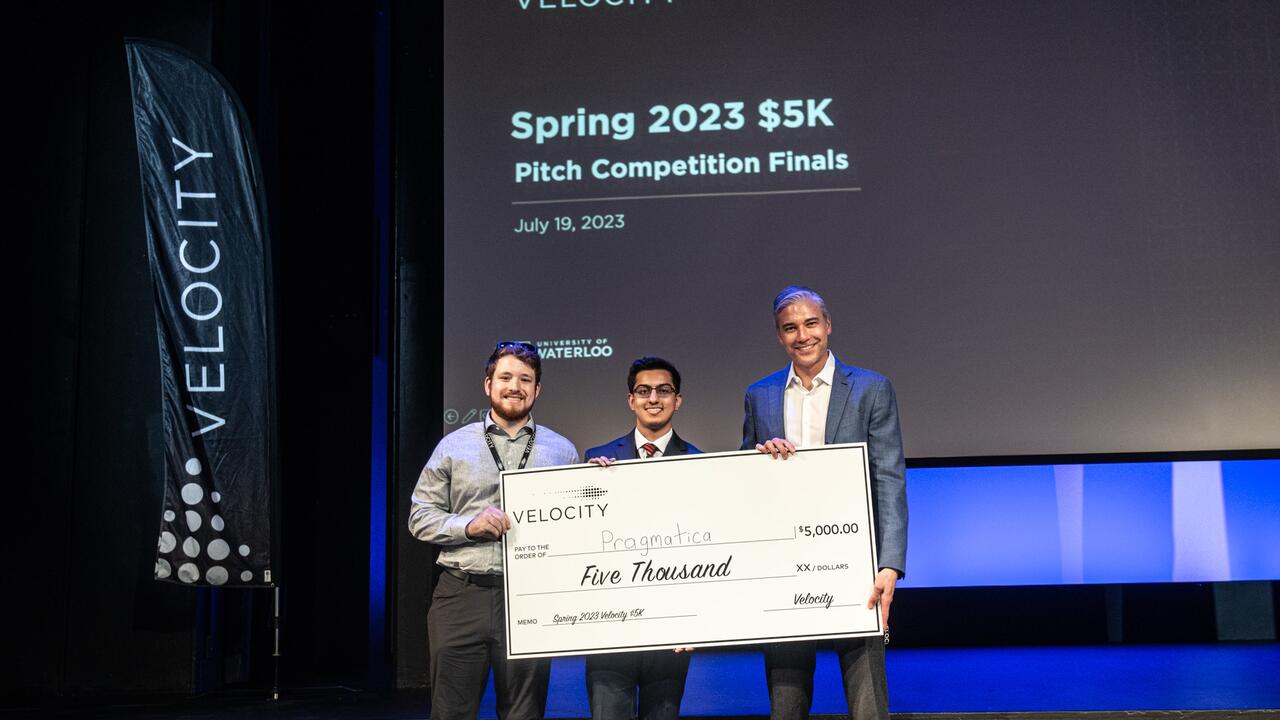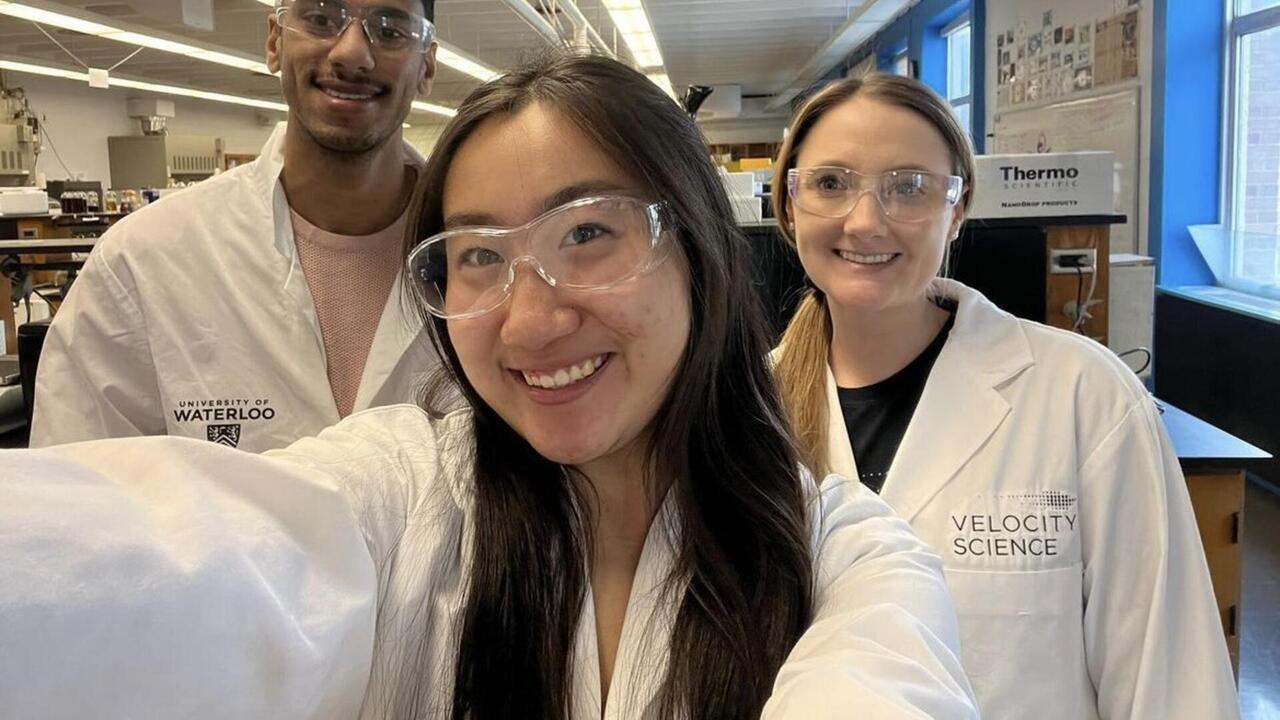
Entrepreneurship for everyone
Students and business leaders at Waterloo are pushing back on the idea that there’s only one way to be a successful entrepreneur

Students and business leaders at Waterloo are pushing back on the idea that there’s only one way to be a successful entrepreneur
By Melodie Roschman Faculty of MathematicsStudents and business leaders at the University of Waterloo are pushing back on the idea that there’s only one way to be a successful entrepreneur. It’s a movement that’s been growing in every part of the Waterloo entrepreneurship ecosystem.
You don’t have to be a super-star founder with the next unicorn start-up. There are lots of ways to get involved with entrepreneurship, and every student has something to gain from embracing an entrepreneurial mindset.
“Canada needs more innovators,” says John Dick, the director for campus with Velocity. “We need people who are actively looking for problems, then taking the time to determine a problem’s cause before rallying a team to devise a solution and implement it. We need innovative nurses, teachers, businesspeople, and public servants. Literally any occupation you can think of needs to have more innovative people joining its ranks.”

Two members of Pragmatica, one of the summer 2023 winners of the Velocity $5K contest, pose with John Dick (right), Velocity's director for campus operations.
When people think about student entrepreneurship at Waterloo, they often think about the semi-annual Velocity $5K Pitch Competition, which encourages start-ups that make a product or service designed to remedy a problem.
While those businesses are a core aspect of Velocity’s focus as an incubator, Velocity is working to give all students experience in how to be innovators – experiences, he says, that “they can apply to any path they choose.”
Successful innovation, he argues, shows up in many different forms.
“The financial bottom line is not the only metric that should be counted. The millions of patients served, the hundreds of thousands of tons of C02 removed from the atmosphere, the millions of crops grown, the thousands of immigrants and international students helped and the millions of hours of productivity saved by Velocity-supported companies work in tandem with business development milestones to produce truly great outcomes.”
Sarah Wilson is a vocal advocate for this model of success. The second-year computer science student and 2022 Schulich Leader didn’t have entrepreneurship experience when she started university.
She decided to immediately join a Waterloo company anyway: the eco-start-up 3cycle, founded earlier that year by Schulich Leader Jason Amri, to find recycling solutions for the plastic waste created by 3D printing.

Sarah Wilson (centre) at a Velocity lab with fellow students
She began as vice-president of sales and marketing, and has recently transitioned to vice-president of technology. Wilson loves the way she’s been able to connect with peers in the classroom, at Velocity and at 3Cycle.
“I’ve gotten to meet so many like-minded entrepreneurs and hear about lots of cool and innovative ideas people have,” she says.
“3cycle might just sound like an environmentalism start-up,” she says, “but behind the scenes, there’s engineers, analysts, product managers, developers, and so many other roles. Your idea doesn’t have to be related to what you’re studying and you don’t have to be a pro at your field to want to make a difference in your community. No idea is too small and no person is incapable!”
There are a range of opportunities for students to get involved with entrepreneurship and innovation. There’s Velocity, Greenhouse, and the Conrad School for Entrepreneurship and Business. Students can also connect with initiatives in their faculty.
In the Faculty of Mathematics, Math Innovation brings the spirit of entrepreneurship to students, whether they’re founding a company, joining an established team or just seeking to learn more.
Last year, thanks to support from alum and Later.com founder Ian MacKinnon, Math Innovation introduced the Math Entrepreneurship Fund, which provides financial support to students pursuing their next big idea, like the student founders of humanitarian milk pasteurization start-up Safi. The fund also supports the Entrepreneurship and Impact Series, which invites successful Waterloo alumni to talk candidly about their career trajectories.
“We want to focus on how people can have a unique impact on the world, building on their interests and education, rather than focusing on a particular path such as a start-up,” explains Charles Clarke, associate dean for innovation and entrepreneurship in the Faculty of Mathematics.
“Even if you do end up as part of a start-up,” Clarke says, “not everyone can or should be a CEO. Founding Software Engineer, for example, might be a better route for some people.”
Ultimately, he says, “fostering an entrepreneurial mindset means thinking about how you can have that unique impact in any career.”

The co-founders of Safi (centre, in Safi t-shirts, L-R: Martin Turuta, Daria Margarit, and Miraal Kabir) with Rwandan farmers and agricultural officials
Read more
Startup Safi tapped entrepreneurial resources including Velocity and Math Innovation Office to bring their idea to life

Read more
Undergraduate student Sarah Wilson making an impact… in her first term

Read more
Engineering student showcases science communications through video on advanced concept in physics
The University of Waterloo acknowledges that much of our work takes place on the traditional territory of the Neutral, Anishinaabeg, and Haudenosaunee peoples. Our main campus is situated on the Haldimand Tract, the land granted to the Six Nations that includes six miles on each side of the Grand River. Our active work toward reconciliation takes place across our campuses through research, learning, teaching, and community building, and is co-ordinated within the Office of Indigenous Relations.